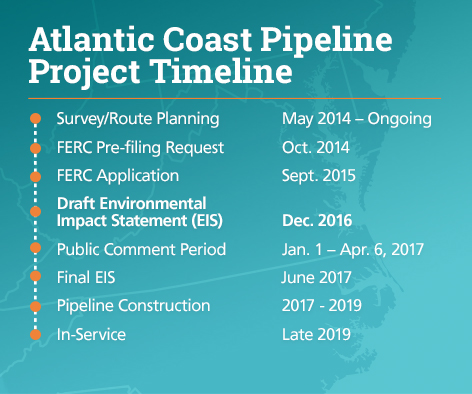On December 30th, 2016, the Federal Energy Regulatory Commission (FERC) released its Draft Environmental Impact Statement (DEIS) for the Atlantic Coast Pipeline. But that may leave you asking, what is a DEIS anyway? And why should it matter to me, or this project?
First you need to know that an Environmental Impact Statement (EIS) is a legally required document that lays out the positive and negative effects a project — like an interstate, natural gas transmission pipeline — will have on its environment. It is the culmination of years of research, public meetings and gathering of public input. Before approving a project, FERC uses this document to determine if the need for the energy outweighs any potential negative effects to the environment. The Draft EIS is simply the first draft of that document.
So what happens now?
The DEIS launched a 90-day open comment period for the public to review and make comments on the findings in the statement. FERC will also hold meetings along the pipeline route where the public can attend and give feedback on the DEIS in person. After this period closes, FERC will review all the comments filed, and may revise the draft statement before issuing a final EIS.
“[The] draft report is another major step forward for a project that is vital to bringing
new jobs, cleaner air and energy security to our region,” said Leslie Hartz, Dominion Energy’s Vice President of Pipeline Construction, “Among other findings, the draft report confirms that the measures proposed by Atlantic Coast Pipeline significantly reduces and mitigates the environmental impacts of the project.”

How can you help?
If you support clean, affordable, American energy and the ACP — FERC needs to hear from you. FERC will take public feedback into account before issuing a final EIS, and opponents to the project are sure to make their opinions known.
Contact FERC today and tell the commission you’re standing up for reliable energy.
You can also attend a public comment session in your area to voice your support for the ACP. Meetings will be held along the pipeline route from February 13 to March 2, 2017. For dates, times and locations, please visit: dominionenergy.com/acp.